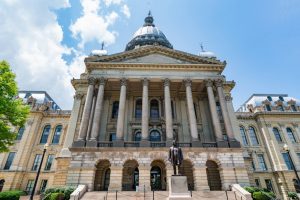State lawmakers, top office holders getting pay raises
By Jerry Nowicki Capitol News Illinois — January 10, 2023
Under the bill, Illinois lawmaker salaries will increase to $85,000 annually, up from approximately $73,000 – a roughly 16 percent increase to their base salary. The state’s constitutional officers are also slated to receive raises.
SPRINGFIELD – Officials at the highest levels of state government will receive substantial pay raises this month after the House and Senate passed a budget bill that also advances a $400 million business incentive fund proposal pushed by Gov. J.B. Pritzker.
Under the bill, lawmaker salaries will increase to $85,000 annually, up from approximately $73,000 — a roughly 16 percent increase to their base salary. Lawmakers also receive per diem reimbursements and stipends for leadership positions. Additionally, the measure adds new leadership positions within any caucus that maintains a supermajority – which Democrats currently do – that are eligible for stipends.
The state’s constitutional officers are also slated to receive raises, which created a frantic timeline for lawmakers in the General Assembly to send the bill to the governor to sign before 11:30 a.m. Monday, when those officers are scheduled to be sworn in to their new terms.
Shortly after the measure was filed Friday night, Democrats pushed the measure through the Illinois House over Republican objections. It received a Senate committee hearing late Sunday afternoon before being approved by the full chamber later in the evening. Pritzker signed it Monday hours before the new statewide officers were sworn in at a Springfield convention center.
Under the pay schedules outlined in the bill, salaries of the lieutenant governor, comptroller and treasurer will increase from $143,400 to $160,900; and the attorney general’s and secretary of state’s from $165,400 to $183,300.
Pritzker told the Associated Press Saturday that the idea for cabinet pay raises originated with him as an effort to retain top talent and make Illinois’ salaries commensurate with other large states. Lawmakers, he also told the outlet, maintain the authority to determine their own salaries.
Sen. Elgie Sims, D-Chicago, reiterated that the raises were meant to help Illinois attract “the best and the brightest.”
“I would love for all of us to be able to be millionaires and billionaires, I would love for all of us to be able to be wealthy,” Sims said. “That’s just not the case.”
The governor’s pay would increase to $205,700 from $181,670, although Pritzker, who has a net worth exceeding $3 billion, does not take a salary.
Top state agency directors and some of their deputies will also receive raises for their terms that begin anew this month. That includes a salary of at least $200,000 for Department of Children and Family Services director Marc Smith, up from $182,300.
Several other agency heads, including that of the Department of Corrections (to $200,000), Department of Agriculture (to $180,000) and the Department on Aging (to $165,000), will also see raises. The raises generally range from 10 to 15 percent, and the governor will have the authority to up those salaries under the measure. The agency salaries will also be subject to increase at the rate of inflation.
Sen. Chapin Rose, R-Mahomet, faulted the measure for including the automatic raises, calling it “bad policy.” He noted that lawmakers already effectively received a 2.4 percent pay bump in July, as Democrats declined to negate the automatic cost-of-living increase laid out by state law.
“If I took a poll of my current district…and said, ‘How many folks in my district got a 20 percent pay raise in six months?’ there wouldn’t be a single hand,” Rose said. “And that’s all I gotta say about this.”
The wide-ranging bill also allows for the transfer of $850 million to the state’s “rainy day” fund to buoy its balance, currently at its highest-ever levels.
And it allows for the transfer of $400 million to a “large business attraction fund” backed by Pritzker. The governor has floated such a “closing fund” as one that would keep Illinois competitive with its neighbors in trying to lure new businesses, such as electric vehicle-related companies, to Illinois.
House Majority Leader Greg Harris said last week that the fund would need to be further defined in law before any of the money could be spent.
The measure was contained in Senate Bill 1720.
It was heard in a Senate appropriations committee with an amendment to Senate Bill 969, which would contain a broader appropriations bill. Sims said the proposed supplemental spending plan for the current year includes an additional $520 million in general revenue fund appropriations, along with $3.6 billion in other state funds and $70.8 million in federal funds.
The general revenue spending was largely made possible by better-than-expected tax revenues which have continued to surpass state agencies’ budget estimates throughout the fiscal year.
SB 969 still needs approval from both chambers of the General Assembly. The last day for substantial action until new lawmakers are sworn in for the 103rd General Assembly is Tuesday.
Other measures still to be considered include a ban on high-powered weapons and a broad bill that requires insurance coverage of abortion and gender-affirming care medications, along with elements aimed at growing Illinois’ reproductive health care workforce.
jnowicki@capitolnewsillinois.com







